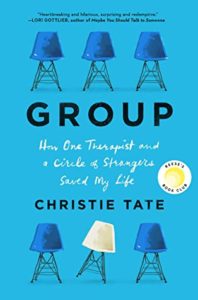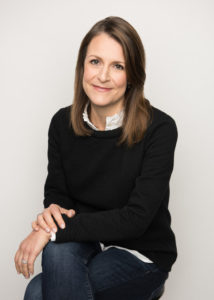“Group: How One Therapist and a Circle of Strangers Saved My Life.” I was going to write this whole title above but it wouldn’t fit.
I have been a little concerned about my reading. It has been difficult to get engrossed in a book. One of the things I love about reading is getting so lost in a story that I can’t put it down. But everything lately has felt blah and boring. It might be the pandemic or the monotony of my days. Or it could just be my reading choices. I’ve been reading the new biography of Jimmy Carter and it is a slog.
 So reading “Group” by Christie Tate was a welcome surprise. The book is a memoir about Christie Tate’s years in group therapy. Christie is, at first, a law school student who is attending 12 step meetings for an eating disorder. She is thinking about killing herself and gets into group therapy with Dr. Rosen. Dr. Rosen has an unconventional therapy style: all his patients receive therapy in groups and nothing is private or secret. His philosophy is that secrets destroy intimacy and being honest in a group will allow the patient to be honest in other relationships.
So reading “Group” by Christie Tate was a welcome surprise. The book is a memoir about Christie Tate’s years in group therapy. Christie is, at first, a law school student who is attending 12 step meetings for an eating disorder. She is thinking about killing herself and gets into group therapy with Dr. Rosen. Dr. Rosen has an unconventional therapy style: all his patients receive therapy in groups and nothing is private or secret. His philosophy is that secrets destroy intimacy and being honest in a group will allow the patient to be honest in other relationships.
This lack of privacy is startling and, some reviewers feel, unethical. But I saw it as a therapy choice. If patients felt it was unethical, no one was forcing them to go to therapy. Christie begins to attend group and makes progress toward healthy relationships in the group. Her personal life, however, continues to be a mess. She “falls in love” with one unsuitable man after another: alcoholics, drugs addicts, married men, men who are emotionally unavailable. Each chapter I wondered when she would learn her lesson and start speaking up for herself.
Christie obviously loves Dr. Rosen and her group members. The problem is that she has to learn to love herself. This is the part of the book that I found most interesting. What makes one person resilient and self-confident and makes another one self-destructive? Christie has a brother and sister who didn’t deal with the psychological issues that Christie has. Christie never felt that she could ask for what she needed. She never felt she was worthy of love or that she was okay as a person. Would her therapy help her learn to cope with her feelings?

I found the book fascinating as Christie worked through all her issues. It was a page turner because I wanted to find out if she eventually healed or if she self-destructed. Either seemed possible through most of the book and I occasionally got impatient with her continual bad choices. She had a lot of temper tantrums as she let out years of repressed feelings. But isn’t that true of most of us? We should learn from our mistakes and yet we keep making the same ones over and over.
If you are going to judge the kind of therapy Christie receives or the person she is at the beginning, do not read this book. If you are interested in the story of how one person, with the help of her group, learned to change her life, then this book is for you. The writing drew me in and I ended up caring about Christie Tate and hoping she would figure it out.

One comment